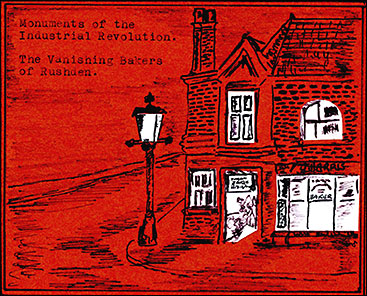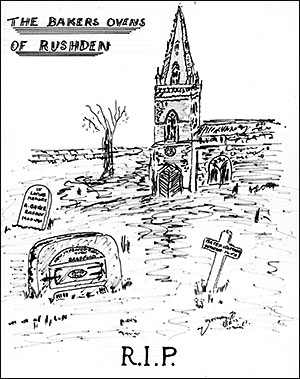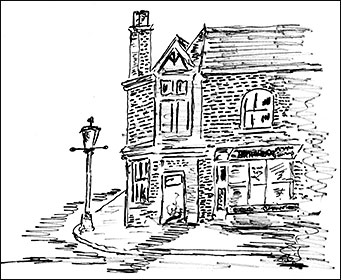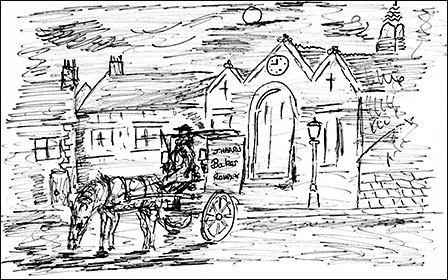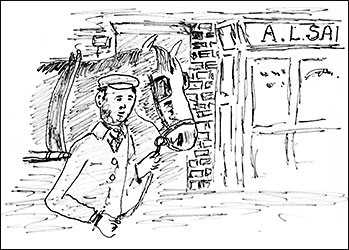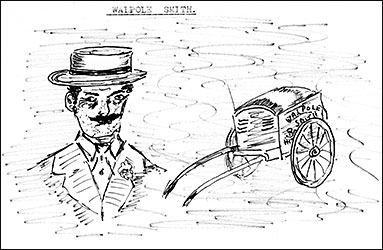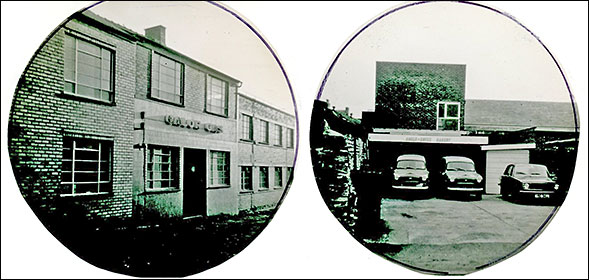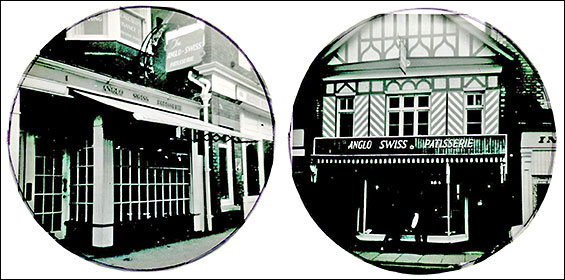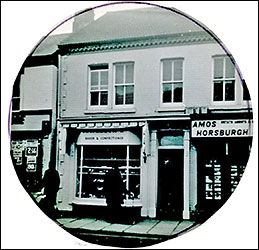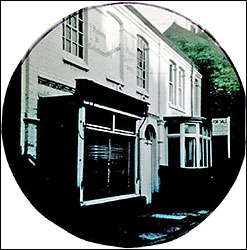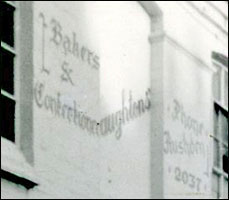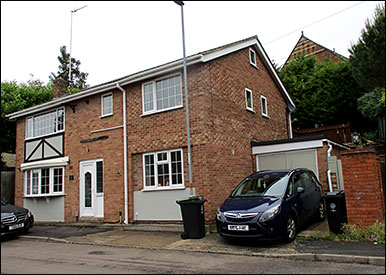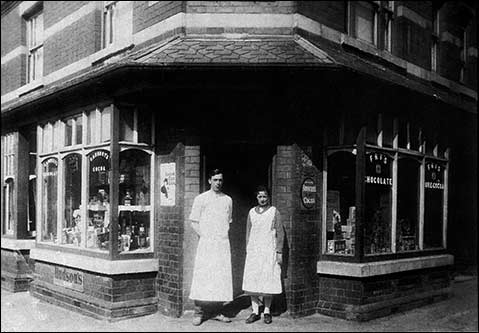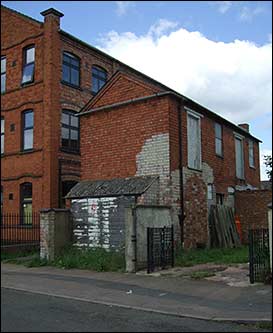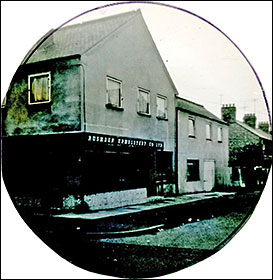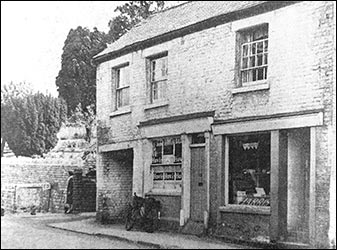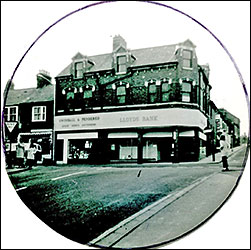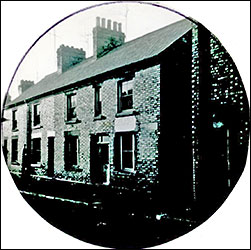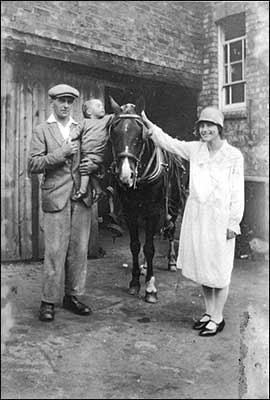|
|
|||||||||||||||||||||||||||||||||||||||||||||||||||||||||||||||||||||||||||||||||||||
| Eric H Barrett, 1971 |
|||||||||||||||||||||||||||||||||||||||||||||||||||||||||||||||||||||||||||||||||||||
|
The Vanishing Bakers of Rushden
|
|||||||||||||||||||||||||||||||||||||||||||||||||||||||||||||||||||||||||||||||||||||
|
Monuments of the Industrial Revolution - c1940
|
|||||||||||||||||||||||||||||||||||||||||||||||||||||||||||||||||||||||||||||||||||||
|
This document was donated to Rushden Museum in 2023,
The Bakers' Ovens of Rushden In structure, Rushden is an odd town: In the lateness and rapidity of its Development perhaps odder still. It has no ancient history and at the beginning of the 19th Century, it was a small village of some six hundred inhabitants. By 1900, it had become an industrial town of 15,000 people, mostly employed in the traditional industry of the area, the making of boots and shoes. The only buildings of any architectural significance are the Parish Church of St. Mary, with its famous Strainer Arch, and Rushden Hall, for so long associated with the Pemberton and Sartoris families. The rest of the town is like some bizarre fruit cake, the light red of the midland brick being punctuated with slithers of blue slate and occasional chippings of ironstone from the Nene or Welland Valleys. From the air, it must indeed look like some devilish dessert. H.E. Bates, in his book "The Vanished World" writes:- "The geography of the town might indeed have been laid out by some shoe-making dictator who insisted that for every hundred yards of dwelling houses there should be thirty or forty of factory sandwiched between and then added the humanitarian proviso that a bakehouse and a Chapel should be tucked away among them". Bates goes on to described how immediately opposite his own house were two identical bakehouses, at the far end of the street yet another and a fourth barely fifty yards further on. Industrial Archaeology has been referred to as containing "Monuments of the Industrial Revolution" and while in no way would I rate the bakehouses of Rushden with the Cotton Mills of Oldham, I am certain that the Bakers' Ovens would abound as inscribed headstones in the cemetery created and sustained by that incurable disease - technological innovation. We will, for the present, when looking into the needs of these 15,000 worthies, who lived, and indeed still do live, not on a shoe string but perhaps hobbled by a boot lace, ignore the chapels and the pubs and try to seek out Mr. Bates' beloved bakehouses. From 1918 to 1939, in peacetime, Silver Jubilee, Sunday School Treat, in Rushden, there were no fewer than eighteen Bakers. Most of the premises were situated on the corners of streets or end of terraces, a few were in the middle of a row, one or two were detached and a couple held pride of place in the High Street. Of these eighteen, all but three have disappeared. One has moved from one side of the A6 to the other, leaving behind its coal-fired oven for a cleaner electric device. Others have became antique shops, offices, betting shops and the like. One is in the exalted position of now being Lloyds Bank, Rushden Branch. No longer do the youngsters of the town rush to the Bakers before School to get the hot crusty loaves and have the opportunity to nibble the corners on the way home. No longer does 'Dad' complete with white-starched shoemakers apron, proudly bear the Yorkshire Pudding home to 'Mum' at twelve thirty on Sunday, fresh from its incubation in the still warm Bakers' oven. Tradition has it in these parts, that the Bakers' Wife never had to bother with making a Yorkshire, the "Governor" would take a spoonful of batter from each pudding brought for cooking, and pour it around his own joint of beef. But enough, reminiscing, let us take a journey around this stronghold of Methodism and manufacturing and discover what has happened to these bakehouses of yesteryear and their prize possession. The Oven The one remaining Reynolds Coal Fired Baking Oven in Rushden. Every day since 1899 this oven has produced over three hundred leaves made by Ray Britten and his father before him. Fired by Bestwood Bakers nuts pre war and Heanor Opencast since those days this oven has no thermometer. "Experience is my only guideline" says Mr Britten. "Repairs? I suppose I would have to get the blacksmith to do them; Reynolds are still in business but I don't suppose they would have any spare parts; they made things to last in those days". The list of Bakers, considering the size of the town, is quite formidable.
It is not possible in a short space of time to visit and record all of these places, but the starting point for investigation is number 10. The bakehouse of "Ollie Lenton" in Pratt Road, at the eastern end of the town, is now used as a Book-makers Office. The large coal-fired oven, made by Reynolds of Harrowden, is covered with hardboard and serves as a notice board for racing results and forecasts. An interview with Mr. Lenton revealed some interesting facts. He was born in 1909 and joined his father in the baking trade in 1924 on leaving School. His story goes as follows:- "at the age of fifteen, the Schoolmaster, a Mr. Perkins, gave me a paper to take to my parents, asking which trade I was to follow; the old dad tore it up and said "You are bloody well coming with me"."This was obviously a time of strict parental authority and Mr. Lenton went on to say "I was never allowed to do a paper round and earn 3/6d a week for pocket money, but before going to School each day, I had to set out the Shop and grease the baking tins prior to the days baking". On one occasion another of the town's Bakers, a Mr. Saint, asked Mr. Lenton Senior if he might borrow the boy for a week, whilst his own man was on holiday. After a week of delivering bread, working for twelve hours every day, the reward was eight shillings, seven and sixpence of which was pocketed by Mr. Lenton Snr! A story of bad debts and large families began to unravel and I learned of the shoemakers working in their 'Shops' at the back of the house and sending their wives and children to the factories with the partially made shoes each Friday and when the cash was brought back, a week-end of colourful oblivian ensued, brought about by consuming prodigious quantities of the local beer, "Praeds Pride". Monday was included in this "Shoemakers Week-end" and when the Baker called for his money, the answer was often "he only gave me four bob this week, you'll have to wait". A four-pound loaf at this time, sold for 7½d. The Reynolds Oven was coal-fired, usually burning Bakers Nuts from Gedling or one of the Nottingham Pits, at a price of around £3 10s. 0d. per ton, and had to be cleaned out daily with a wet sack tied to a long pole. The soot deposits fell away easily when the oven was hot. Particular care had to be taken with this cleaning on Sunday morning when, until Wartime Rationing stopped the habit in 1942, over one hundred Sunday dinners were cooked. While these dinners were cooking, the men would gather in the warm bakehouse and partake readily of the nine-gallon barrel of beer, which Mr. Lenton kept in the shed. No thermometer was built into the oven and experience was the only guide-line. In addition to the 1½d. charge for the cooking, an extra perk at this time was the sale of a pennyworth of salt, cut from 28lb. blocks and used to spice up the Yorkshire. Once a year, just after Christmas, the local Working Mens’ Clubs gave their members "A FEED". Huge baking tins capable of holding a quarter of a sheep were brought to the Bakehouse, together with the meat, cooked for an hour and then batter was poured in. The finished product being wheeled away to the Club in a hand cart to form the centre piece on the trestle table at the "Feed". During the early 1950s the Reynolds oven ceased to be used for the baking; it was replaced, although not removed, by two portable coke burning ovens. These have since been disposed of and Mr. Lenton could not recall the name of the Manufacturer. Until he retired in 1955 Mr. Lenton produced between three and four hundred loaves every day and for most of the time in business, the flour and yeast were mixed by hand. Mr. Lenton never changed to motorised transport and his horse and van were the last to be seen in Rushden some sixteen years ago. "It was a hard cut-throat life, what with the 2/- in the £1 Co-op divi, too many competitors and getting up at three every morning." "Still, those days are gone." Rushden Co-operative Society [Rectory Road near the Queen Street Store] Once the shop and bakehouse for the co-op the premises are now used by a shoe repairer, Mr N.Shortland. The shop was so small that the newly baked bread was arranged outside on factory shoe racks. The picture of the shop has been seen all over the world having been copied in error by artist John Ward when sketching the pictures for H.E. Bates 'The Vanished World.’
Norman Shortland is not a Baker, he repairs shoes. He was surprised one day to see an artist sketching his shop. Enquiries established that it was John Ward, who was drawing some local colour for H.E. Bates 'The Vanished World.’ He was amused by the fact that the artist had the wrong location and should have been drawing Mr. Britten's Shop. Architecturally they are very similar. Talking to Mr. Shortland revealed, however, that his shop was also at one time a Bakers. He could not recall the name, but remembered that it was acquired by the local Co-op in the 1920s. He recalled a donkey, or pony, being kept in the yard at the rear. Another interesting point is that the shop was so small, the coal oven completely filling it, that the newly baked bread was put outside the shop on shoe racks, the customers usually choosing their loaf like a library book, mainly while it was still warm. The building is a typical end-terraced shop with a large Shoe Factory opposite and the workers would buy their bread on the way home at six o'clock, and occasionally purchase a loaf during the day to eat at the factory bench. There is no evidence of "Sunday dinner cooking" but the people would probably have used the nearby Butchers' Shop, which still has an oven, although now no longer used. Another local worthy, a Mr. Burfield, when plied with several pints, talked of local bakers at some length. He recalled a Mr. New who was sacked from Tilleys "they were the high-class bakers", determined to set up in business on his own but could not find any premises. Eventually an oven was found in an 'Off-Licence' in the nearby village of Irchester and Mr. New baked his bread there. Being unable to drive, he had to hire a taxi to bring the bread into Rushden, from where he used to deliver by carrier bicycle. An added problem was that he was also unable to ride a bike and "'e 'ad to push the bugger round." Some colleagues persuaded him to buy a van, and soon he was the proud owner of a Singer 5 cwt. vehicle "but 'is legs were too bloody short and the clutch was too bloody strong" so alas, Mr. New faded from the scene. My 'Beery' informant, Mr. Burfield, went on to tell me of another Baker, a Mr. Saint, whose premises were opposite Mr. Brittens. "E were anything but a saint" (a fact borne out by the talk with Mr. Lenton earlier) "'is 'orse were that bloody thin, if anyone borrowed it they could slide it under 'is gate when they finished with it."
Both Mr. Burfield and Baker Britten talked at some length about one of Rushden's characters; Harris the "Midnight Baker". Every evening between ten and half-past, he would set off with his horse and van towards the Bedfordshire Village of Wymington, where most of his deliveries were made. By the time he arrived, almost all of his customers had gone to bed and ways of ensuring delivery was unorthodox to say the least. Paper carrier bags were left hanging on door knobs; loaves were propped up on window-sills and his favourite depository was on the lavatory seat, most of the 'privvies' being in a row at the bottom of the yard. Considering that at this time most of these outbuildings were of "the bucket and chuck it" variety, one wonders that perhaps the bread of Wymington was an acquired taste. Sad to say, the Midnight Baker is no longer with us, but he is still talked about in Rushden when people get into a "do you remember" mood. His bakehouse is now a small engineering works and his shop forms part of a garage. At the junction of Harborough Road and Little Street, there stands today a furniture workshop, used by the Antique Dealer opposite. to doctor-up any damaged furniture which he hopes to include in his display of Victoriana and old mineral-water bottles. Until about ten years ago, this corner shop was the production unit of another Bakers shop. That of the Bayes Brothers, Arthur and Charlie. The old oven can still be seen through the dusty window. It is another Reynolds of Harrowden. The coal store for this oven was in an old stone "barn", part of old (c.1700) Rushden and was situated on the opposite side of the road, the coal being wheeled down to the bakehouse as required by the brothers in turn. The local Coal Merchants of the day used to vie for custom when a wagon load of Bestwood Bakers Nuts arrived at the L.W.S. Station, and to the one who secured the Bayes Brothers' order it was a triumph indeed.
Three tons of "Best Nuts" at a little under £2 per ton would constitute the sale of the week. Add to this the prospect of a cash payment, the Bayes had this kind of reputation. The little yellow Bedford van was for many years almost a fixture of the Rushden landscape. Not for the Bayes Brothers a horse and cart, but the most modern transport that money could buy. Not time either for "chinwagging" at the back door. Their motto would seem to be "get the job done well and off to Chapel." Charlie is still living in Rushden, close by his old work place. Handicapped by Arthritis, he still manages to ride a bicycle, with the aid of a walking-stick. To people who see this for the first time, the spectacle causes amusement, as well as amazement! Ironically, the coal store has now been converted into a Chapel of Rest for a local Undertaker, so coffins and corpses now occupy the space of the three tons of Bakers Nuts.
Should one wish to cash a cheque at Lloyds Bank, as one looks over the counter, it is difficult to visualise that fifty years of baking history lie under one's feet. This modern branch opened in 1971, was for many years the shop of Walpole Smith, High Class Baker and Confectioner. No motors for this man, not even a horse and cart, for Walpole Smith was a "Handcart" man. This brown handcart was usually to be found blocking the footpath between his shop and the Barbers Shop, next door. The actual baking was carried out just around the corner, in what is now a "Do-It-Yourself" handymans' shop. The oven was removed some years ago; it was certainly a coal-burning oven, but another Reynolds? - Who can tell? A talk with an old lady of eighty, revealed that she remembered Walpole Smith very well. "He always wore a straw hat and had a turn in one eye, but he was a good man for all that." The same lady also remembered Harris, the "Midnight Baker." "We never used to go to bed much before twelve o'clock, but the bread would always be on the step when we got up, and he would have to go to Wymington after that." George Lines had his shop in Crabb Street. Little can be found about this one. The shop is now converted into two flats and the bakehouse (or stables) at the rear is now a Decorators' Workshop.
Billingham and Cook, two of Mr. Lenton's competitors, also seem to have faded from the scene in a comparatively short time. Their premises in Newton Road became a Fish and Chip Shop during the 1930s but is now closed, not having been used for the last ten years. Brian Laughton was one of the last Bakers to "pack up his Whites' and seek summer climes. He closed his bakehouse in Moor Road in 1970 and left for the south coast. The premises have been empty ever since, still, however, fully equipped for baking, but even the "For Sale" sign shows signs of weathering. The most modern bakers in Rushden is that of Mr. Corbett, situated in the oldest part of the town, Little Street. It is one of the most modern shops. Originally the premises were situated on the A6 trunk road, but the old stone property was demolished for road-widening and a detached dwellinghouse now stands at the rear of the site. The business was founded around 1890 by a Mr. Harris (no relative to the 'Midnight Baker') and the original shop was still lit by gas up until the 1950s. The oven was coal-burning, but, regrettably the maker cannot be established. Deliveries were made in the locality by Tradesman's bicycle and, in later years, further out to the villages of Newton Bromswold and Chelveston by motor-van. The premises were compulsorily purchased by the County Council, work was held up on the road-widening scheme to allow Mr. Corbett to construct his new shop, some 200 yards away. The business is now carried on by his son, the baking being done by electricity. The old premises were used, like many others, for the Sunday morning baking ritual, various aisles were cooked in the oven as well as the traditional Yorkshire. My elderly lady informant recalled one occasion when two young brothers (now prominent businessmen in the town) called to collect their Sunday dinner which consisted of stuffed bullock's heart, started arguing and fighting and of course, the pan and dinner flew all over the Bedford Road, but "they scooped it up and put it back in the pan; it never seemed to hurt them. I think of it every time I see them." Mr. Keech keeps a shop in the High Street, originally owned by a Mr. Cobley. Mr. Keech used to work there and took over the business when Mr. Cobley retired. The shop is well-known in the town for its cakes and tarts as well as bread. The baking again is done by electricity, local deliveries are made by motor van. The large Headquarters of the Calor Gas Company in Higham Road were once the bakehouse and shop of Arthur Crane. Today the business has transferred to Higham Ferrers, with a large electric baking plant and the son, Brian Crane has formed a partnership with a Swiss Baker, Jules Lienberger, and, opened Anglo-Swiss patisseries in Higham Ferrers, Rushden, Bedford and Wellingborough. No deliveries are made to private houses, but the Company has an excellent reputation for outside catering, weddings and the like. The retail shops are designed in a Swiss style and look very attractive, set amongst the more mundane architecture of the four towns. Tilley's, of Wellingborough Road, have always held the reputation of being "the High-Class Bakers" of Rushden. The business is now owned by a Mr. Turner, but the name of Tilley remains. The premises have changed little since first built in 1860. The flour still has to be man-handled up a ladder from the street to the loft. The baking is done by means of coke-fired ovens, manufactured by Allied Iron Founders. The present apparatus is over thirty years old and expensive to run. At the time of writing 'Sunbrite' (Hard coke) is being used at the rate of about a ton and a half each week, which, at today's prices, works out at about £1,600 per annum for the baking alone. Mr. Turner has had both the Gas Board and the Coal Board submit plans for a change of apparatus, so it would appear that Rushden's one remaining coke oven will soon disappear.
Two other Bakers of the past offer little in the way of historical interest. One, a Mr. Albert Hawes had a business in Church Street, this is now part of a department store, selling garden furniture and kitchen equipment, etc. The other Baker, a Mr. Lord, had premises in Portland Road. It is believed that these premises were later used as garages for Taxis, when he changed his line of business, but information on Mr. Lord is not very forthcoming. [Mr Lord lived in Cromwell Road]
We come now to the last of the "ancient Britons", a Mr. Ray Britten in fact. Baker, Historian and Raconteur, Mr. Britten still rises every morning at three to commence the days baking. This shop must be unchanged from the days when H.E. Bates lived opposite in 1925, and probably the same equipment is still being used. Mr. Britten proudly showed me a highly burnished, and black-leaded Reynolds oven, still used, every day and still "firing on all cylinders" as it was in 1899 when Mr. Britten's father bought the shop. These days there are no such thing as 'Bakers Nuts' and the oven has to perform on Realtor opencast or Shirebrook cobbles, or indeed, whatever coal can be found. Ray Britten recalled the Bakers of the past, the Saints, the Harris', the Corbetts' etc., and said that often organised parties of schoolchildren came to visit his bakehouse and watch the preparation of the bread. I asked if Reynolds still made ovens and where he went for spare parts. He thought for a moment and said:- "Well, I expect I would have to get the blacksmith to do any repairs, but it's been going every day for seventy-three years to my certain knowledge and has never needed mending yet. You know, boy, they made things to last in those days".
|
|||||||||||||||||||||||||||||||||||||||||||||||||||||||||||||||||||||||||||||||||||||
|
Illustrations
|
|||||||||||||||||||||||||||||||||||||||||||||||||||||||||||||||||||||||||||||||||||||
|
|
|||||||||||||||||||||||||||||||||||||||||||||||||||||||||||||||||||||||||||||||||||||
|
I started this study with the idea of looking at 'Monuments of the Industrial Revolution, the Bakers' Oven' : what has emerged is, in fact, a memorial to a way of life. A brief glimpse back to the days of gas lamps, horses and carts, grimy factories and hard-working but very happy people. Could those 'bad old days' really have been so bad? When talking to many of the old people, a great sense of contentment seemed to prevail. Memories of 'Midnight Bakers', Charlie Chaplin appearing at the High Street Palace, Teas in the Streets after Mafeking, the Great War, the last War, the Sunday morning Yorkshire pudding procession, the Shoemakers Weekend. Perhaps not a monument, but certainly the cherubim and seraphim which surrounded one. We have looked at the Bakers but what of the other tradesmen who helped to keep the ovens glowing and the handcart wheels turning; the Coal Merchants, Wheelwrights, Blacksmiths, even the town lamplighter, but I feel that this must form another study in the saga of this "disappearing age." It is perhaps sad that the future generations will only know the sight smell and taste of the wrapped 'Supermarketed' sliced loaf, but perhaps some student of the 21st century will be given the task of finding out what happened to the mighty Cooperative Feferal bakery at Wellingborough or even the Nationally known 'Mother's Pride' works at Welwyn. Such is the passage of time. E.H. Barrett 1971. His tutor added: A sound effort. A listing of source material would have been valuable, Maps alike. [he gave him a ‘B’ for the work] |
|||||||||||||||||||||||||||||||||||||||||||||||||||||||||||||||||||||||||||||||||||||
